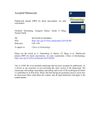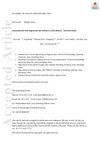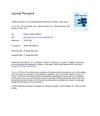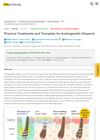 17 citations,
January 2021 in “Dermatology and Therapy”
17 citations,
January 2021 in “Dermatology and Therapy” Laser-assisted drug delivery has shown improved treatment outcomes for skin conditions and has potential to reduce side effects and treatment time.
 113 citations,
July 2015 in “Journal of Cosmetic Dermatology”
113 citations,
July 2015 in “Journal of Cosmetic Dermatology” Platelet-rich plasma may help with hair growth and skin quality but more research is needed to confirm its effectiveness.
 June 2023 in “International journal of science and research”
June 2023 in “International journal of science and research” PRP injections help hair regrowth safely but may need more research.
April 2024 in “International journal of molecular sciences” Light-based treatment, Photobiomodulation, shows promise for non-invasive skin therapy with few side effects.
 1 citations,
November 2022 in “Journal of Dermatological Treatment”
1 citations,
November 2022 in “Journal of Dermatological Treatment” Platelet-rich plasma can increase hair density and may help treat some skin conditions, but it's costly, not FDA-approved, and needs more research.
 April 2024 in “Lasers in medical science”
April 2024 in “Lasers in medical science” Lasers and light therapies are effective in promoting hair regrowth for different types of hair loss.
 9 citations,
January 2016 in “Journal of cosmetology & trichology”
9 citations,
January 2016 in “Journal of cosmetology & trichology” Fractional laser treatment helped hair regrowth in patients with alopecia areata.
 January 2019 in “Clinical Dermatology Open Access Journal”
January 2019 in “Clinical Dermatology Open Access Journal” Combining corticosteroids and non-ablative fractional laser therapy may effectively treat extensive alopecia areata.
 40 citations,
February 2012 in “Dermatology Online Journal”
40 citations,
February 2012 in “Dermatology Online Journal” Lasers might help hair growth in some alopecia cases, but more research is needed to confirm their effectiveness and safety.
1 citations,
August 2024 in “Cosmetics” Melasma treatment is difficult, but combination therapies and personalized plans show promise.
 25 citations,
June 2018 in “Clinical and Experimental Dermatology”
25 citations,
June 2018 in “Clinical and Experimental Dermatology” Combined microneedling and minoxidil improves hair growth more than minoxidil alone.
 12 citations,
October 2012 in “Dermatologic Clinics”
12 citations,
October 2012 in “Dermatologic Clinics” Low-Level Laser Therapy and other light treatments for hair growth lack strong evidence and need more research.
4 citations,
December 2021 in “Applied sciences” Micro-needling with low-level light therapy effectively increases hair growth in people with mild to moderate hair loss.
 2 citations,
January 2011 in “Elsevier eBooks”
2 citations,
January 2011 in “Elsevier eBooks” Early treatment of acne is crucial to prevent scarring and psychological effects.
 3 citations,
January 2020 in “Plastic and Aesthetic Research”
3 citations,
January 2020 in “Plastic and Aesthetic Research” Non-surgical procedures can help reduce wrinkles and stimulate skin repair by understanding skin aging at the molecular level.
 281 citations,
January 2013 in “British Journal of Dermatology”
281 citations,
January 2013 in “British Journal of Dermatology” Manage vitiligo with treatments, address emotions, and use camouflage techniques.
 12 citations,
June 2019 in “Clinics in dermatology”
12 citations,
June 2019 in “Clinics in dermatology” PRP shows promise for skin rejuvenation but needs more research.
 10 citations,
May 2015 in “International Journal of Women's Dermatology”
10 citations,
May 2015 in “International Journal of Women's Dermatology” New treatments for skin and hair disorders in women of color address unique biological differences and include specific acne medications, sunscreens, skin lighteners, and hair care adjustments.
 5 citations,
July 2018 in “Experimental Dermatology”
5 citations,
July 2018 in “Experimental Dermatology” The "Punch Assay" can regenerate hair follicles efficiently in mice and has potential for human hair regeneration.
 4 citations,
October 2020 in “JAAD Case Reports”
4 citations,
October 2020 in “JAAD Case Reports” Platelet-rich plasma may improve vitiligo treatment when used with phototherapy.
 4 citations,
December 2016 in “Medical lasers”
4 citations,
December 2016 in “Medical lasers” Lasers can be effective for treating hair loss from alopecia areata.
 February 2023 in “Archives of Dermatological Research”
February 2023 in “Archives of Dermatological Research” Laser treatment, especially when combined with other therapies, is effective for hair regrowth in alopecia areata.
 January 2023 in “Journal of cosmetic dermatology”
January 2023 in “Journal of cosmetic dermatology” Fractional lasers effectively treat alopecia areata, especially when combined with minoxidil or cortisol.
 March 2020 in “Faculty Opinions – Post-Publication Peer Review of the Biomedical Literature”
March 2020 in “Faculty Opinions – Post-Publication Peer Review of the Biomedical Literature” Combining nonablative fractional laser with minoxidil was effective for alopecia areata with only one patient relapsing after a year.
 January 2024 in “Journal of Cosmetic Dermatology”
January 2024 in “Journal of Cosmetic Dermatology” The 1565 nm non-ablative fractional laser is more effective and satisfying than 5% minoxidil for treating hair loss.

Low-level laser therapy is the most effective for hair loss, but other treatments also show promise.
 July 2024 in “Medical alphabet”
July 2024 in “Medical alphabet” Modern therapies, like fractional laser, effectively treat telogen effluvium.
 28 citations,
December 2017 in “Lasers in Medical Science”
28 citations,
December 2017 in “Lasers in Medical Science” Monochromatic light devices, especially the 308-nm excimer laser, are promising for treating alopecia areata but more research is needed.
 1 citations,
January 2015 in “Journal of Pigmentary Disorders”
1 citations,
January 2015 in “Journal of Pigmentary Disorders” Treating melasma in men is difficult, especially for the deeper skin layers, and may need more than just topical treatments.
 August 2023 in “Dermatologic Surgery”
August 2023 in “Dermatologic Surgery” Wounding may stimulate hair growth, but more research is needed to confirm the safety and effectiveness of related treatments.



























